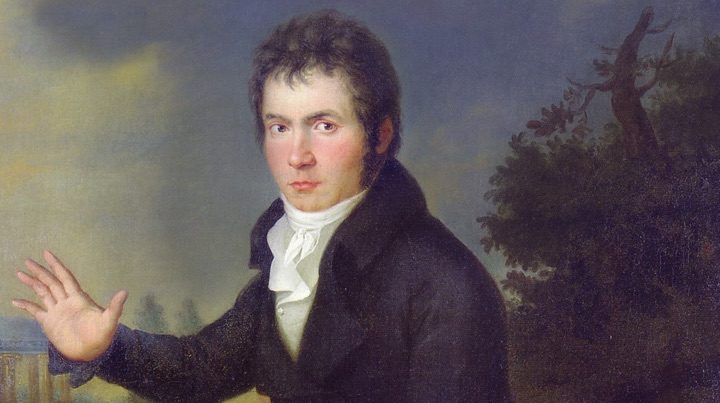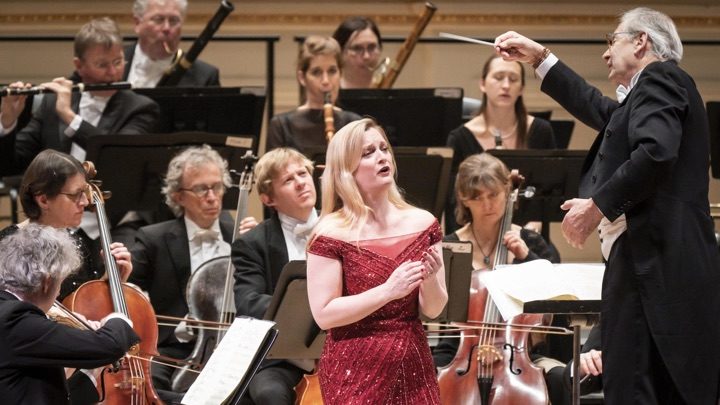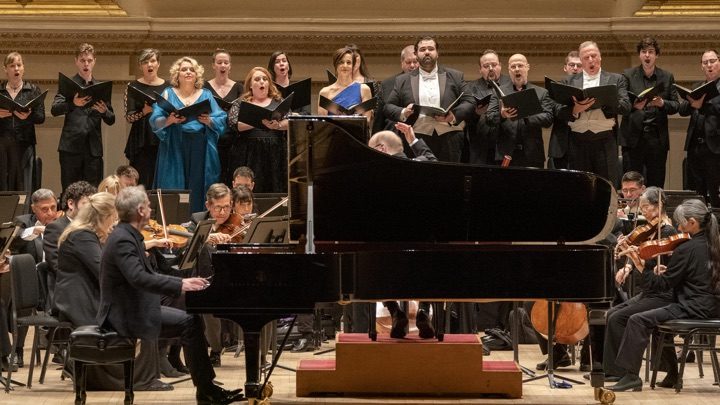
Many opera houses are producing Fidelio while concert venues of every stripe have been ringing with symphonies, string quartets or piano sonatas. Beyond endless iterations of overly familiar works, several of Beethoven’s rarer vocal and choral works popped up in illuminating recent concerts at Carnegie Hall by the Orchestra Révolutionaire et Romantique and the Orchestra of St. Luke’s.
The former, a period-instrument ensemble conducted by Sir John Eliot Gardiner, embarked on its traversal of all nine symphonies on February 19, surrounding the First with excerpts from the ballet Die Geschöpfe des Prometheus, the glorious concert aria Ah! Perfido and two bits of Leonore, the first version of his sole opera Fidelio. Much like last season’s revelatory Berlioz concerts, Gardiner and ORR hoped to allow its audience to hear Beethoven anew.
Though performing works by Handel, Bach and many other 18th century composers in an “historically informed performance (HIP)” style has been occurring for decades now, it’s still not so common to hear HIP applied to the 19th century Romantics.
Gardiner’s exciting First Symphony (long a favorite of mine) in particular shone thanks to the orchestra’s vibrant natural horns, biting oboes and bassoons, earthy wooden flutes and hearty, nearly vibrato-free strings. Adding to its urgency, the violinists and violists played both it and the Leonore Overture No. 1 standing.

Crowe, usually heard as an accomplished baroque and Mozart singer, was most successful in the concert aria which Beethoven composed in Prague in 1796 for Josepha Duschek for whom Mozart had written two decades earlier “Ah, lo prevedi,” and ten years later the better-known “Bella mia fiamma.”
Dramatic sopranos like Kirsten Flagstad and Birgit Nilsson occasionally programmed Ah! Perfido, but Crowe’s lighter but stirringly passionate rendition placed the enthralling scena of the anguish of betrayal directly in the line of those earlier Mozart-Duschek works.
Her radiant voice moved with pointed attack and enviable flexibility; only some straight-toned top notes betrayed her baroque roots. Rather than an epic Olympian Ah! Perfido, we got an arrestingly human portrait of the heroine’s breaking heart.
Speaking of the baroque, the text of Ah! Perfido was adapted from Metastasio’s libretto for Achille in Sciro. By coincidence Francesco Corselli’s 1744 setting of Achille will receive its modern stage premiere at Madrid’s Teatro Real next week.
The technical difficulties of Ah! Perfido seemed child’s play next to the Leonore aria which Crowe fought to an eventual draw. Like the Overture, the composer’s earlier stab at “Komm, Hoffnung” with its initial arresting spoken opening became an exercise in anticipation and frustration for anyone who knows Leonore No. 3 or Fidelio.

The ORR was founded by Gardiner in 1989 and I first heard them the following year at Queen Elizabeth Hall in a program that also included Ah! Perfido. The soprano was supposed to have been Charlotte Margiono; however, a fiery Elizabeth Connell stepped in. But Margiono later recorded it with Gardiner and it was issued on CD with Beethoven’s Messe in C and Meeresstille und glückliche Fahrt.
Those two choral works showed up on last Thursday’s Orchestra of Luke’s concert with La Chapelle de Québec under Bernard Labadie. Yet another Leonore Overture was programmed—dubbed No.2 though it was written first—as well as the more traditional crowd-pleaser (though still not often heard) Choral Fantasy which featured the bravura playing of pianist Jeremy Denk.
I’ve long owned the Gardiner recording of the Messe which had assured me that I liked that mass better than the enormously imposing Missa Solemnis. However, I hadn’t listened to the CD for a long while and though Labadie and his forces offered an intense and accomplished reading, I came away more ambivalent about the earlier work’s effectiveness.
As it was commissioned by the Esterházy family, Messe in C is often compared to Haydn’s incomparable masses written for the same family. Beethoven’s work emulates Haydn’s masses as well as those by Mozart in its use of four soloists—here, Karina Gauvin, Kelley O’Connor, Andrew Haji and Matthew Brook—alternating with and sometimes joining the chorus.
Though there were lovely and stirring passages throughout, overall the Messe in C felt doggedly earnest rather than inspired which might account for its infrequent performances compared to the Missa Solemnis or Beethoven’s most popular choral work, the Ninth Symphony.
One got a striking echo of the Ninth in the rousing conclusion of the Choral Fantasy which unusually offers for much of its 20-minute length a mini-piano concerto. Eventually the chorus abetted by six soloists arrives with a thrilling paean to glory of music.
Both the odd Fantasy and the brief, haunting Meeresstille und glückliche Fahrt (Calm Sea and Prosperous Voyage) for chorus alone winningly showed Beethoven at his most searching and inventive. The superbly blended 35-member Chappelle Québec brought a sonorously robust vigor to all three works.
If its longtime expertise in pre-Romantic music meant that its fierce sopranos relied rather too much on penetrating straight tone, the group set the large concert hall ringing with a focused sound more satisfying than groups many times its number.
The Missa Solemnis arrives at Carnegie twice before the actual Beethoven birthday in December: next month with the Atlanta Symphony under Robert Spano and then in October with Yannick Nézet-Séguin leading the Philadelphia Orchestra.
Occasionally Crowe’s finely glowing instrumental tone reminded me of that of Gundula Janowitz, a noted Leonore, whose live recording of Ah! Perfido is offered as an addendum.
Beethoven: Ah! Perfido
Amsterdam
11 April 1978
Broadcast
Gundula Janowitz
Concertgebouw Orchestra
Conductor – Bernard Haitink
Photos: Chris Lee (Crowe); Richard Termine (Messe)



